- Home
- Colleen Gleason
The Carnelian Crow: A Stoker & Holmes Book (Stoker and Holmes 4) Page 18
The Carnelian Crow: A Stoker & Holmes Book (Stoker and Holmes 4) Read online
Page 18
We’d arrived at the front door, and just as I was about to reach for the latch, Mr. Oligary took both my gloved hands and turned me to face him. He tugged me closer so that my hem brushed over his shoes.
“Miss Stoker…Evaline,” he added belatedly. “May I call you Evaline?”
“Of…of course,” I replied. (I couldn’t very well say no at that point, could I?) But that put a layer of intimacy between us that I wasn’t ready for—or wasn’t even certain I wanted.
“I think you are one of the most beautiful and charming women I’ve had the pleasure of knowing,” he said, squeezing my fingers lightly. “I look forward to getting to know you even better. And I sincerely hope that tonight’s event won’t become a usual sort of thing.”
“I certainly hope not either,” I replied flatly. “Watching a man jump to his death in public was not a pleasant experience.”
The smile curving his mustache faltered a bit. “That as well, but I was referring to that—er—display when you ran over and threw yourself at Lord Cunningham. You were running, and there were your ankles and petticoats showing when you jumped on him, and, well—Evaline, it’s simply not done.” His eyes crinkled at the corners as he looked down at me with a meaningful expression. “And I wouldn’t want actions like that to…er…taint the Oligary name.”
My throat dried up. My palms went damp and my insides fluttered in more of a discordant way than a happy one.
“I should have thought any person would put a man’s life ahead of the reputation of his name,” I countered quietly. “Mr. Oligary.”
“Ned,” he replied. “You may call me Ned, Evaline—and of course a man’s life is more important than one’s reputation. But the dignity and composure of a woman is also very important.”
I wanted to demand to know why, especially when someone’s life was at stake, but I was a coward. I thought of Bram and Florence, and how I held their future—and mine—in my hands (literally, as I was still holding Mr. Oligary’s), and I remained silent.
Yes, I could face down a glowing-eyed, sharp-fanged demon with hardly a change in my pulse, but here my courage failed me.
“Evaline,” he said, tilting his head a bit. His eyes grew warmer. “May I kiss you goodnight?”
I couldn’t swallow. Nor could I say no—partly because I didn’t have the courage to do so, and partly because, well, I thought I should at least give it a try. If there was any chance I was going to marry the man, I should at least—
He must have taken my silence as permission, for he leaned forward, drawing me closer so that we collided gently, and kissed me.
My first sensation was of the bristly prickles of his mustache, and the second was of the warmth of his lips on such a cold night. Third, I smelled him: the men’s cologne he wore and whatever pomade was in his hair. And last: it was much warmer being that close to him.
It wasn’t unpleasant, tasting him that way. Nor did it last very long. Our lips brushed together once, twice, settled for a longer moment, fitting together at the seams…and then it was over.
When he pulled away, Mr. Oligary—I supposed I could think of him as Ned now that he’d kissed me—looked at me with that very warm, sparkling gaze.
“Thank you, Evaline,” he said. “I hope that will be the first of many kisses—and other moments—that we’ll share. And now,” he said, stepping back reluctantly, “I suppose I should relinquish you to your sister. I believe the curtain has twitched, indicating that she’s watching us.”
“Good night, Mr.—Ned,” I replied.
“I am quite busy tomorrow, but I will call on you Monday. And I’ll speak to your brother then as well.”
“Right,” I managed to say. Oh drat!
As Mr. Oligary—Ned, I mean—started down the walkway, I thought I saw something move at the edge of shadows just beyond the tree near my bedroom window.
I paused, my heart thumping, my hand on the door latch, and peered sharply into the darkness. My insides churned and fluttered, but I saw nothing else.
Nothing else to support my sense that someone had been watching.
Miss Holmes
~ Of Permissible Nomenclature and a Delayed Reaction ~
The next morning, I sat at the kitchen table utilizing my Profitt’s Dandy Paper-Peruser to hold the papers open, and then to turn them, while I scanned the sheets and nibbled on my breakfast muffin at the same time. I’d discovered how necessary the Peruser was in keeping my news free of the inevitable tea stains and crumbs, and so I rarely read the news without it.
It was no surprise that all of the early editions carried the startling news that Lord Cosgrove-Pitt was dead.
MP Plunges to His Death, said one headline. Lord C.P.’s Last Party, was another. A Terrifying Farewell, screamed a third. What Happens Now? inquired yet a different take on the situation.
What did happen now? That was, indeed, my question. One that had frustrated me for several days—ever since the crow had tapped at my window and delivered a red cloisonné version of itself—but was becoming even more urgent.
It was well past one o’clock by the time Grayling and I left Cosgrove Terrace last night. Though he’d attempted several times to make arrangements for a vehicle to take me home while he handled the scene in his official capacity as a member of the Metropolitan Police, I’d declined.
There were far too many considerations for me to leave before it was strictly necessary, and although I’d hoped to have a private moment with Lady Isabella (for obvious reasons), that didn’t materialize. She’d succumbed to the “vapors” and was taken solicitously to her bedchamber by an entire fleet of ladies and maids. I hadn’t bothered to attempt to follow or otherwise intercept her.
Due to the late hour, there was a dearth of traffic, so the carriage ride back to my house was relatively brief. This gave Grayling and me only a short time to confer over the startling discovery we’d made on Lord Cosgrove-Pitt’s body, as well as to agree that meeting at his office for me to try his hyper-magnifyer would need to be post-poned.
“Two puncture marks on the back of his neck,” Grayling said as he eased into his seat across from me. Obviously, he’d been waiting for an opportunity to broach the subject in private. “Hardly noticeable unless one was looking for them—excellent thinking on that, Miss Holmes.”
“Similar to the ones on the guard who was killed at the British Museum during the Betrovian visit,” I pointed out, probably unnecessarily.
“And identical to the marks on the UnDead in the Ankh’s underground laboratory,” he added. “The vampires on which she appeared to have been experimenting.”
I spared a moment to appreciate his proper grammatical usage (there’s something about a misplaced preposition in speech that I find particularly annoying), then allowed my thoughts to move on to consider the situation.
We knew that the marks in question—the ones on the vampires, at least—had been made by two wires being inserted into the backs of their necks. These wires extended from the small metal devices that Pix had been known to deal in—something that Dylan had described as batteries. Apparently, they were a mechanism that stored power (electricity, in this case, or so we believed) and the wires allowed the power to be conducted into a machine or other device. That sort of device would be not only illegal (due to the electrical attachment), but also a unique and advantageous item.
What was hoped to be accomplished by this activity of poking two wires from a battery into the back of the UnDead was open to conjecture, but based on what we’d witnessed in the Ankh’s lair—just before she electrofied Pix—I believed the purpose was some sort of attempt to control or tame the vampires.
While we hadn’t actually seen wires poking into the back of the British Museum’s guard’s neck—or anywhere else—the placement was similar to that of the ones on the UnDead in the Ankh’s lair, and also on the vampire on which I’d leaped in Pix’s underground hideaway. (I chose not to mention this recent encounter to Grayling for obvious reasons.)
/>
Most importantly—and quite horrifyingly—the placement and size of the punctures on the UnDead also matched a pair of marks I’d discovered on Lord Cosgrove-Pitt’s neck.
“Clearly the Ankh is somehow behind this.” Grayling sounded weary and frustrated as he ran his fingers around the brim of the top hat he held. “But I saw no indication that she was present at Cosgrove Terrace tonight. I’m certain you’ve already taken the opportunity to question as many bystanders as possible as to whether they’d seen the Ankh, or anyone who could be her. Did you learn anything helpful?”
I opened my mouth then snapped it shut. I couldn’t inform Grayling that his distant aunt by marriage—not to mention one of the foremost members of Society—was, in fact, the evil villainess known as the Ankh. At least, not until I had some sort of irrefutable proof.
“There was a particular maidservant who caught my eye,” Grayling continued. “One of the servers, perhaps having been brought in as extra help for the party. She seemed out of place, and somehow familiar. But I never was able to see her face—you know how busy they are—and once Lord Cosgrove-Pitt made his tragic move, I was otherwise occupied.”
“Understandably so.”
Fortunately, before Grayling could press the topic further—for I wasn’t certain I’d be able to keep my knowledge of the Ankh’s identity to myself if he pressed—we arrived at my home.
“This was not precisely how I anticipated the evening to end, Miss Holmes,” Grayling said as he assisted me down from the carriage.
“Nor I,” was my reply.
Obviously, neither of us made the jest about my affinity for attracting or discovering dead bodies. It would have been in poor taste, considering that the dead body in question was a distant relative of the inspector’s.
“Nevertheless, I thank you very much for the invitation,” I said as I withdrew my key for the door.
“I—er—particularly enjoyed our waltz tonight, Miss Holmes. Despite the fact that it was interrupted so unpleasantly.”
“I concur; it was far more enjoyable than waltzes past—that is, until poor Lord Cosgrove-Pitt made his move.” I shook my head sadly. “He was clearly not in his right mind, Inspector. And yet…at least he seemed jovial at the end.”
“I suppose that is some small comfort,” he replied, and the underlying sadness reminded me again that we were speaking of his family member—albeit a distant one.
“Good night, Inspector,” I said, stepping up onto the threshold. As I turned to close the door, I saw that he was still standing there. He seemed to want to say something more, for he exhaled a cloud of frosty air.
“Is there something else, Inspector?” I asked, my hand on the door. As I was just inside the house, I placed a bit higher than normal, which, with my heeled shoes, raised my eyes to nearly the same level as his.
“Er…perhaps you might wish to— That is…Miss Holmes, I believe it would be perfectly proper for you to refer to me by my given name. Ambrose. Rather than Inspector. Particularly on—er—occasions such as tonight, when we are in a social environment. Rather than in an official capacity.”
I blinked. “Oh. I see. Right. Yes, yes, I do believe that would indeed be permissible. Ambrose.”
My face felt unaccountably hot, despite the December night air, and even now, as I thought about it sitting at my breakfast table the next morning, I felt my cheeks grow warm once more.
Ambrose. It was a nice, strong name that suited him well. I probably should have offered him the same token of familiarity—that he should call me Mina—but I’d been so taken by surprise by his suggestion that I hadn’t thought about it until after he’d left.
And the fact that I was thinking about it again yet this morning—when I should have been focused on other, more important matters—frustrated me. It was simply a name.
So I thrust away the warmth that had fluttered in my stomach when he made that request (and every time I thought about it afterward) and forced myself to review what I knew.
There was no doubt about it: a number of interesting and curious things had occurred over the last week. If they hadn’t all happened within days of each other after me having a very dull two months, I might not have thought the incidents were connected.
But, as my uncle was inclined to repeat: there are no coincidences.
Beginning with the visit by the insistent crow and his delivery of the pendant, to the attack by UnDead—who had puncture marks in the back of the neck—at the supposedly missing Pix’s hideaway…to the death of Lady Thistle, the closing of her shop, and the information that my mother had often disappeared (and probably used the now-missing door to The Carnelian Crow) in the back room for hours—to Grayling’s coincidental knowledge of The Carnelian Crow (which must mean he was investigating something about that elusive establishment that he hadn’t seen fit to share)…to the strange and sudden death of Lord Cosgrove-Pitt in a very public forum…
No. There was no one who could convince me that all of those events and their close timing were mere coincidence.
And, though I wasn’t certain why, I was also inclined to include on that list of non-coincidences the sudden and desperate necessity for Evaline Stoker to get married.
But how the pieces all fit together, what they portended and what threat—for surely there was some sort of threat underlying them all if the Ankh was involved—I couldn’t yet deduce.
And I’d forgotten one other thing in my list of not-coincidences: the inexplicable resignation of Irene Adler from her position at the British Museum.
That, I decided, was something that bore more investigation. Particularly since I had left a very special and unique object in her safekeeping at the museum.
I found Miss Adler’s office quite undisturbed when I entered it at the British Museum a short while later. That alone was curious, for if she’d tendered her resignation and had no intention of returning, surely her personal objects would have been removed—or at least packed up.
But everything was still intact: her cogwork teapot, the neat stacks of books, the Tome-Selector and its skeletal fingers reaching for a book by Edgar Allan Poe, the mechanized privacy shields over the windows that looked out onto the grounds. The room even smelled like Darjeeling tea, Miss Adler’s preferred beverage, and her favorite gardenia eau de parfum.
There was a soft layer of dust over everything—something that would never have dared occur when Miss Adler was in residence—and it was that fact which made my curiosity sharpen into worry.
I’m mildly ashamed to admit that I’d been so put off by the debacle of the chess queen affair that I’d been—well, not precisely hiding from Miss Adler (a Holmes is never a coward), but staying out of her way, so to speak. And the fact that she hadn’t been in contact with me merely added to the belief that she shared my feelings.
Thus, when Grayling informed me she’d resigned from the British Museum without notifying me, I confess I’d construed the non-communication and lack of a new address as an indication that Miss Adler no longer had any interest in acting as my mentor. If I had had a niggling suspicion that her disappearance might have been something more sinister than a mere change of occupation, I’d not allowed myself to dwell on it—for fear I was merely attempting to placate my bruised feelings.
But now, as I looked around the office, I realized my niggling suspicions might have been more valid than I’d allowed them to be. There was no indication in this chamber that Miss Adler had planned to vacate it; in fact, all evidence was that she had been in the middle of her normal daily tasks when she left. There was a bit of dried dregs of tea at the bottom of a white bone-china cup. A stack of books sat at the edge of her desk, her mechanized ink pen lay next to them, and the ledger that listed the latest items to have been unearthed from the hundreds of crates in the museum cellar was closed and set aside.
A horrible thought struck me, and I rushed across the room to the bookshelf where I snatched the copy of A Connecticut Yankee in King Arthur’s Court f
rom the shelf. Mark Twain’s story about a man time-traveling from late nineteenth-century America to medieval England had been a whimsical choice as the hiding place for the device Dylan had given me when he’d gone back to his own time.
In my haste, I nearly dropped the slim, leather-bound volume, but managed to keep hold of it at the last minute. This book had an unusual feature in that there was a leather piece that flipped from the back cover over the outside edges of the pages onto the front, and was latched into place—thus keeping the book closed. When the small latch was unhooked, the book opened, and what had previously been a stack of pages of the story—as well as some short humorous pieces also written by Twain—now had a small rectangular shape cut out of the papers, which—to my dismay—had contained the slender device Dylan called a smartphone.
I glared furiously at the empty spot. There was only one other person aware of what had been secreted inside the book: Irene Adler.
She’d taken the smartphone with her, wherever she’d gone. And without a word to me.
I’d trusted her, which was why I’d left the very unique and special object here at the museum. She and I had agreed it would be best kept in the building because it was the only place Dylan had ever experienced the smartphone doing what he called “connecting” to wherever it connected to. Something called Wie-Fie, something that enabled him to interact or communicate with his time.
The smartphone had been his lifeline while he was trapped here in 1889 London, and he’d left it with me on his return home so that if there was ever the chance we might need each other—or want to communicate—we could attempt to use the strange, sleek device.
And now it was gone. And so was Irene Adler.
What did that mean? Why would she have taken it? For safekeeping?
Surely she hadn’t been using it to attempt to contact Dylan…had she? If so, why?
And why would she have done without a word to me?
I glared around the chamber, now irritated with myself as much as with my former mentor. Perhaps if I hadn’t been so reluctant to contact her, I would have realized her disappearance weeks ago. I swiped my finger through the thin layer of dust. Yes, weeks. Three, by my estimation.

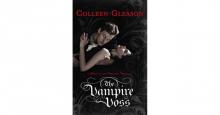 The Vampire Voss
The Vampire Voss Lavender Vows
Lavender Vows Sanctuary of Roses
Sanctuary of Roses A Lily on the Heath
A Lily on the Heath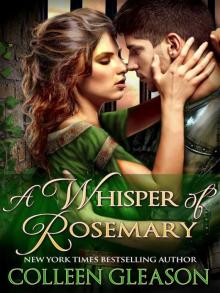 A Whisper Of Rosemary
A Whisper Of Rosemary The Rest Falls Away
The Rest Falls Away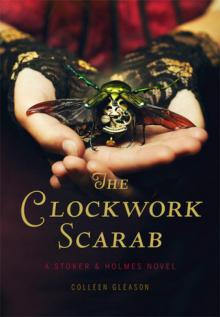 The Clockwork Scarab
The Clockwork Scarab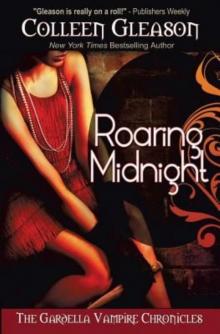 Roaring Midnight
Roaring Midnight The Vampire Dimitri
The Vampire Dimitri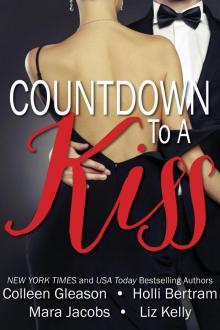 Countdown To A Kiss A New Years Eve Anthology
Countdown To A Kiss A New Years Eve Anthology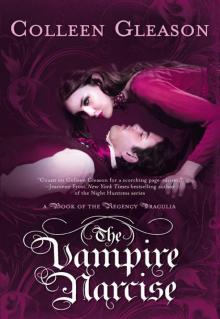 The Vampire Narcise
The Vampire Narcise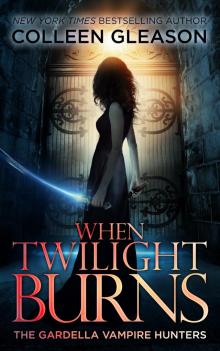 When Twilight Burns
When Twilight Burns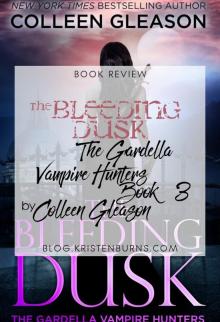 The Bleeding Dusk
The Bleeding Dusk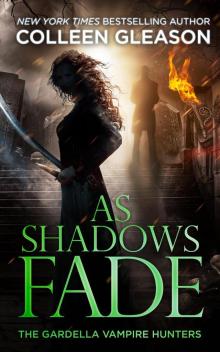 As Shadows Fade
As Shadows Fade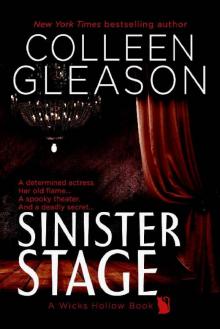 Sinister Stage: A Ghost Story Romance and Mystery (Wicks Hollow Book 5)
Sinister Stage: A Ghost Story Romance and Mystery (Wicks Hollow Book 5)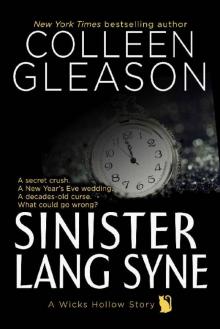 Sinister Lang Syne: A Short Holiday Novel (Wicks Hollow)
Sinister Lang Syne: A Short Holiday Novel (Wicks Hollow) Sinister Sanctuary
Sinister Sanctuary Night Beckons
Night Beckons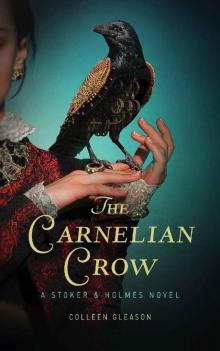 The Carnelian Crow: A Stoker & Holmes Book (Stoker and Holmes 4)
The Carnelian Crow: A Stoker & Holmes Book (Stoker and Holmes 4) The Shop of Shades and Secrets (Modern Gothic Romance 1)
The Shop of Shades and Secrets (Modern Gothic Romance 1) Lavender Vows tmhg-1
Lavender Vows tmhg-1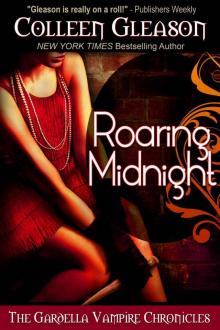 Roaring Midnight (The Gardella Vampire Chronicles | Macey #1)
Roaring Midnight (The Gardella Vampire Chronicles | Macey #1) Lavender Vows (The Medieval Herb Garden Series)
Lavender Vows (The Medieval Herb Garden Series) Dark Secrets: A Paranormal Romance Anthology
Dark Secrets: A Paranormal Romance Anthology Roaring Shadows
Roaring Shadows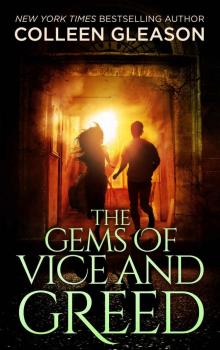 The Gems of Vice and Greed (Contemporary Gothic Romance Book 3)
The Gems of Vice and Greed (Contemporary Gothic Romance Book 3)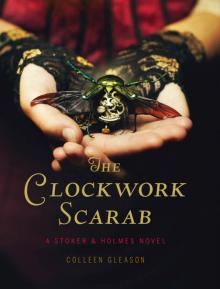 The Clockwork Scarab s&h-1
The Clockwork Scarab s&h-1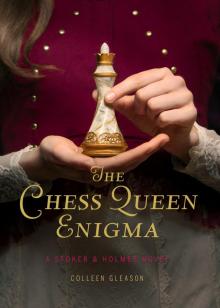 The Chess Queen Enigma
The Chess Queen Enigma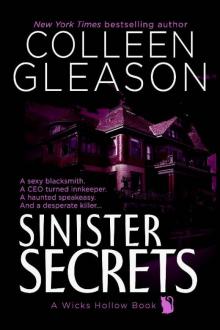 Sinister Secrets
Sinister Secrets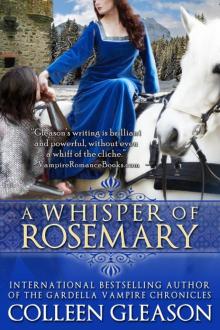 A Whisper of Rosemary (The Medieval Herb Garden Series)
A Whisper of Rosemary (The Medieval Herb Garden Series) Dark and Damaged: Eight Tortured Heroes of Paranormal Romance: Paranormal Romance Boxed Set
Dark and Damaged: Eight Tortured Heroes of Paranormal Romance: Paranormal Romance Boxed Set Roaring Shadows: Macey Book 2 (The Gardella Vampire Hunters 8)
Roaring Shadows: Macey Book 2 (The Gardella Vampire Hunters 8)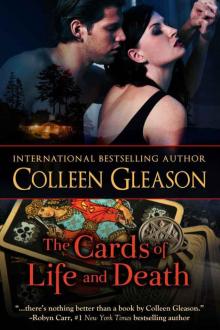 The Cards of Life and Death (Modern Gothic Romance 2)
The Cards of Life and Death (Modern Gothic Romance 2)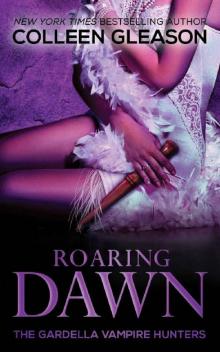 Roaring Dawn: Macey Book 3 (The Gardella Vampire Hunters 10)
Roaring Dawn: Macey Book 3 (The Gardella Vampire Hunters 10)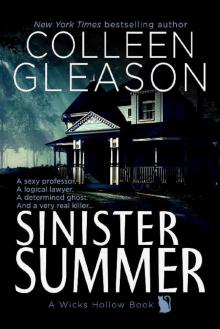 Sinister Summer
Sinister Summer Sinister Sanctuary: A Ghost Story Romance & Mystery (Wicks Hollow Book 4)
Sinister Sanctuary: A Ghost Story Romance & Mystery (Wicks Hollow Book 4)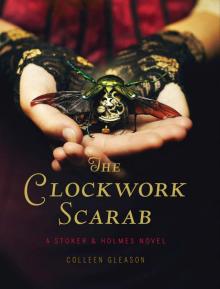 The Clockwork Scarab: A Stoker & Holmes Novel
The Clockwork Scarab: A Stoker & Holmes Novel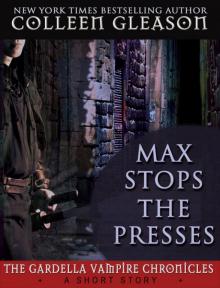 Max Stops the Presses
Max Stops the Presses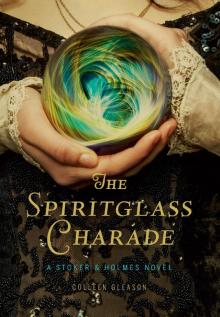 The Spiritglass Charade
The Spiritglass Charade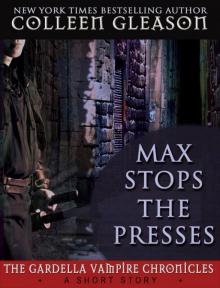 Max Stops the Presses: A Gardella Vampire Chronicles Short Story
Max Stops the Presses: A Gardella Vampire Chronicles Short Story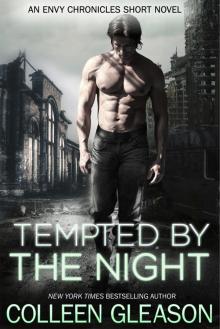 Tempted by the Night
Tempted by the Night